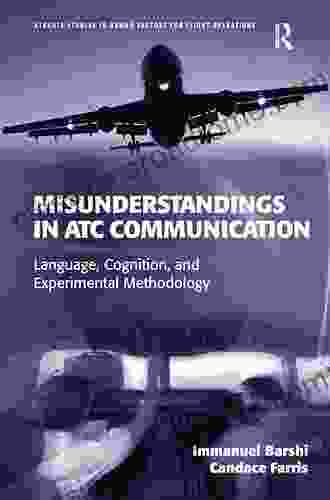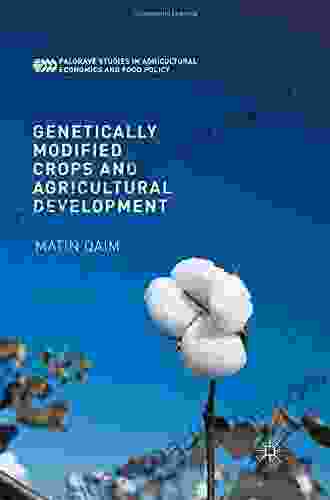Unlocking the Potential of Genetically Modified Crops for Agricultural Development

5 out of 5
| Language | : | English |
| File size | : | 1587 KB |
| Text-to-Speech | : | Enabled |
| Screen Reader | : | Supported |
| Enhanced typesetting | : | Enabled |
| Word Wise | : | Enabled |
| Print length | : | 206 pages |
In the face of a growing global population and the challenges of climate change, the need to enhance agricultural productivity and ensure food security has become paramount. Genetically modified (GM) crops have emerged as a promising tool to address these challenges, offering the potential to improve crop yield, enhance nutritional value, and increase resistance to pests and diseases. This comprehensive guide delves into the world of GM crops and their role in agricultural development, exploring the latest advancements, benefits, and challenges associated with this groundbreaking technology.
Understanding Genetically Modified Crops
Genetically modified crops are plants whose DNA has been altered using genetic engineering techniques. This allows scientists to introduce specific traits into crops, such as resistance to pests or herbicides, improved nutritional content, or enhanced tolerance to environmental stresses. By modifying the genetic makeup of crops, it is possible to address specific challenges and improve their overall performance.
Benefits of Genetically Modified Crops
GM crops offer a range of benefits that have the potential to transform agricultural practices and improve food security:
- Increased Crop Yield: GM crops can be engineered to produce higher yields, which is crucial for meeting the growing demand for food. By increasing the productivity of crops, GM technology helps to ensure a reliable food supply for a growing population.
- Pest Resistance: GM crops can be modified to be resistant to specific pests, reducing the need for chemical pesticides. This not only protects crops from damage, but also reduces the environmental impact associated with pesticide use.
- Herbicide Tolerance: GM crops can be engineered to tolerate specific herbicides, allowing farmers to control weeds more effectively. This simplifies crop management practices and reduces the need for manual labor.
- Improved Nutritional Value: GM crops can be modified to enhance their nutritional content. For example, "Golden Rice" has been engineered to produce beta-carotene, a precursor of vitamin A, which is essential for preventing blindness in developing countries.
- Enhanced Tolerance to Environmental Stresses: GM crops can be modified to withstand environmental stresses such as drought, salinity, and extreme temperatures. This resilience allows crops to thrive in challenging conditions, ensuring food production even in adverse environments.
Challenges and Concerns
While GM crops offer significant potential benefits, there are also challenges and concerns that need to be addressed:
- Environmental Impact: Concerns have been raised about the potential environmental impact of GM crops, such as the transfer of modified genes to wild plant populations or the creation of herbicide-resistant weeds. However, extensive research has shown that GM crops pose no greater environmental risk than conventional crops.
- Health and Safety: Some concerns have been expressed about the health and safety of GM crops. However, rigorous scientific studies have consistently found that GM crops are as safe as conventional crops and meet the same regulatory standards for food safety.
- Intellectual Property Rights: The development of GM crops is often protected by intellectual property rights (IPRs),which can limit access to these technologies for farmers in developing countries. Efforts are underway to ensure equitable access to GM crops and to promote sustainable agricultural practices.
- Public Acceptance: Public perception and acceptance of GM crops vary depending on cultural, social, and economic factors. It is important to engage in open and transparent dialogue with the public to address concerns and build trust in GM technology.
The Future of Genetically Modified Crops
Genetically modified crops have the potential to play a significant role in addressing the challenges of food security and sustainability in the 21st century. As research continues to advance and regulatory frameworks adapt, GM crops are expected to become an increasingly important tool for agricultural development.
The future of GM crops lies in developing more sustainable and resilient crops that can adapt to changing environmental conditions. Researchers are working on crops that can withstand drought, extreme temperatures, and other stresses. Additionally, there is growing interest in using GM crops to improve nutritional content and develop crops that can produce biofuels and other renewable resources.
Genetically modified crops offer a range of benefits that have the potential to transform agricultural practices and improve food security. While there are challenges and concerns to address, ongoing research and advancements in the field of genetic engineering hold promise for developing sustainable and resilient crops that can meet the growing needs of our world.
By embracing the potential of GM crops and working together to address the challenges, we can harness the power of science and innovation to create a more food-secure and sustainable future for generations to come.
5 out of 5
| Language | : | English |
| File size | : | 1587 KB |
| Text-to-Speech | : | Enabled |
| Screen Reader | : | Supported |
| Enhanced typesetting | : | Enabled |
| Word Wise | : | Enabled |
| Print length | : | 206 pages |
Do you want to contribute by writing guest posts on this blog?
Please contact us and send us a resume of previous articles that you have written.
 Book
Book Novel
Novel Page
Page Chapter
Chapter Text
Text Story
Story Genre
Genre Reader
Reader Library
Library Paperback
Paperback E-book
E-book Magazine
Magazine Newspaper
Newspaper Paragraph
Paragraph Sentence
Sentence Bookmark
Bookmark Shelf
Shelf Glossary
Glossary Bibliography
Bibliography Foreword
Foreword Preface
Preface Synopsis
Synopsis Annotation
Annotation Footnote
Footnote Manuscript
Manuscript Scroll
Scroll Codex
Codex Tome
Tome Bestseller
Bestseller Classics
Classics Library card
Library card Narrative
Narrative Biography
Biography Autobiography
Autobiography Memoir
Memoir Reference
Reference Encyclopedia
Encyclopedia American Sport Education Program
American Sport Education Program Amina Sewali
Amina Sewali Andrew Soyars
Andrew Soyars Dorothy Gable
Dorothy Gable T Lobsang Rampa
T Lobsang Rampa Andrew Gutmann
Andrew Gutmann Josh Lockhart
Josh Lockhart Amit Bhatt
Amit Bhatt Amy Moran Thomas
Amy Moran Thomas Deborah Warren
Deborah Warren Jahan Khamsehzadeh
Jahan Khamsehzadeh Anne Palagruto
Anne Palagruto Jane Finkle
Jane Finkle Ben Newman
Ben Newman Andy Phelps
Andy Phelps Amitava Dasgupta
Amitava Dasgupta Ann J Clark
Ann J Clark Jennifer Robinson
Jennifer Robinson Christie Beiring
Christie Beiring James Martin
James Martin
Light bulbAdvertise smarter! Our strategic ad space ensures maximum exposure. Reserve your spot today!

 Joseph HellerUncover the Hidden History and Meaning of Lao Tzu: A Journey into Ancient...
Joseph HellerUncover the Hidden History and Meaning of Lao Tzu: A Journey into Ancient...
 Isaiah PriceFormal Analysis of Future Energy Systems Using Interactive Theorem Proving:...
Isaiah PriceFormal Analysis of Future Energy Systems Using Interactive Theorem Proving:... Gilbert CoxFollow ·4.1k
Gilbert CoxFollow ·4.1k Pete BlairFollow ·18.1k
Pete BlairFollow ·18.1k Gabriel MistralFollow ·3.8k
Gabriel MistralFollow ·3.8k Isaiah PowellFollow ·8k
Isaiah PowellFollow ·8k Edwin BlairFollow ·14.8k
Edwin BlairFollow ·14.8k Hudson HayesFollow ·19k
Hudson HayesFollow ·19k Morris CarterFollow ·2.3k
Morris CarterFollow ·2.3k Willie BlairFollow ·19.9k
Willie BlairFollow ·19.9k

 Braden Ward
Braden WardThe True Story of Murder and Betrayal
In a small town where...

 W. Somerset Maugham
W. Somerset MaughamUnraveling the Complexities of Human Language: A...
Language is a fundamental aspect of human...

 Ibrahim Blair
Ibrahim BlairTrue Crime Tales That Will Keep You on the Edge of Your...
Prepare to be...

 Rick Nelson
Rick NelsonPatterns In Rhyme: A Journey of Discovery with Patrick...
Welcome to the...

 Edgar Hayes
Edgar HayesWithout Pity: Unmasking the Evil Within
In the realm of true...

 Cooper Bell
Cooper BellFannie Lou Hamer's Indelible Legacy: Unraveling the...
The Black Freedom Movement, a pivotal...
5 out of 5
| Language | : | English |
| File size | : | 1587 KB |
| Text-to-Speech | : | Enabled |
| Screen Reader | : | Supported |
| Enhanced typesetting | : | Enabled |
| Word Wise | : | Enabled |
| Print length | : | 206 pages |







